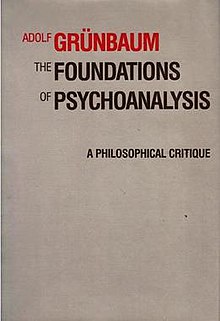
Adolf Grünbaum died on November 15.
He was a professor of philosophy at the University of Pittsburgh perhaps best known as an outspoken critic of Freudianism and psychoanalysis more broadly.
Grünbaum wrote THE FOUNDATIONS OF PSYCHOANALYSIS:A PHILOSOPHICAL CRITIQUE (1984).
This book was in its own way as much a criticism of Popper as of Freud. Psychoanalysis was the paradigmatic case of a pseudo-science for Popper. It was unfalsifiable and thus not a science, but rather a structure of ideas falsely marketing itself as a science.
Popper, though, did not maintain that it was meaningless, or valueless. Had Freud considered himself an author of creative, imaginative, prose he would have been on the right side of the demarcation Popper sought to enforce.
As Grünbaum tells the story, that was misguided. As the Popperian critique itself became conventional, some of Freud's admirers complied with it, on the master's behalf. And so was born the "hermeneutic" school of Freudianism, as espoused for example by Jurgen Habermas and Paul Ricouer, who advanced a Freudianism shorn of scientific pretensions.
Grünbaum's take makes Freud out to be a better scientist and a worse influence than Popper's does. Freud is a better scientist because he did construct a theory that is in important respects falsifiable. One of the reviewers of the book actually suggested that psychoanalysts might be happy about "Grünbaum's award of tentative scientific status to psychoanalysis as a ray of hope for their embattled enterprise."
Not too happy, though. Grünbaum made the point that the falsifiability of psychoanalysis has been confirmed by ... its falsification. He thinks it a worse influence than Popper did because false theories of who we are and how we came to be who we are can be negative influences WHETHER THEY ARE MARKETED AS SCIENCE OR NOT. The hermeneutic reinterpretation preserves the harm that Freudianism can do.
There should be some resounding conclusion here. I can;t just let a discussion of such intriguing questions peter out....
Comments
Post a Comment